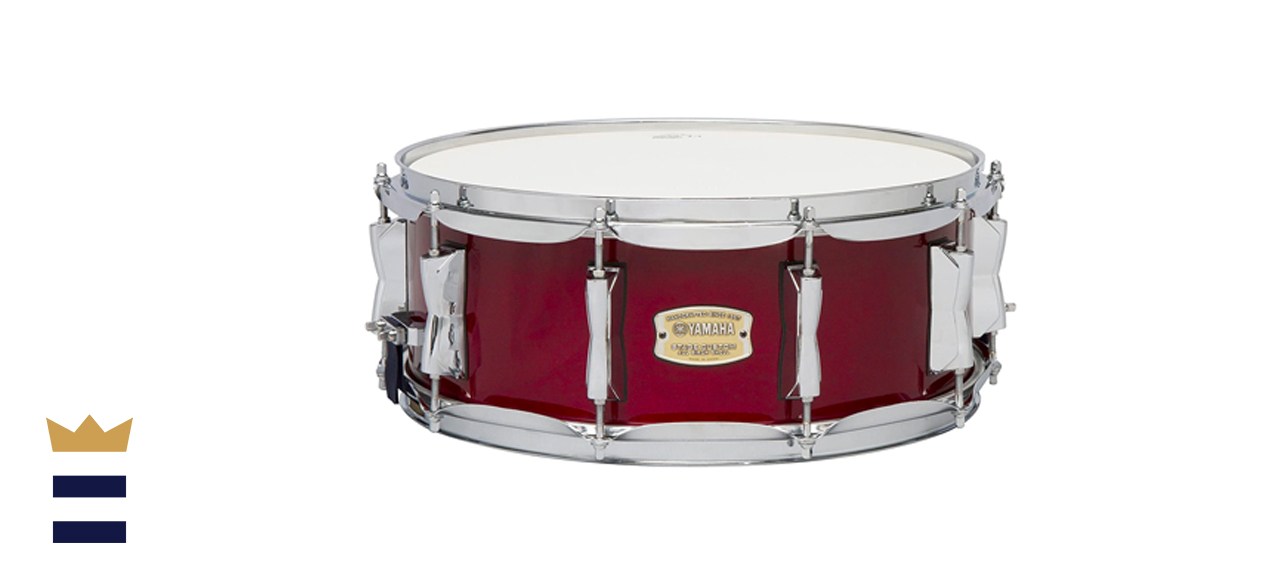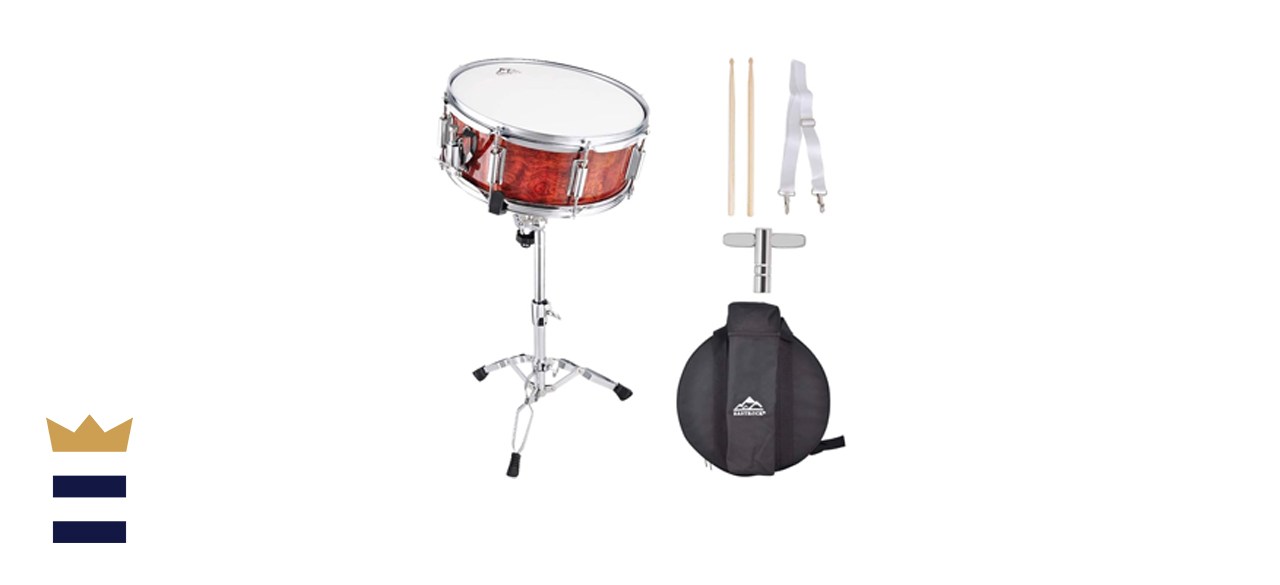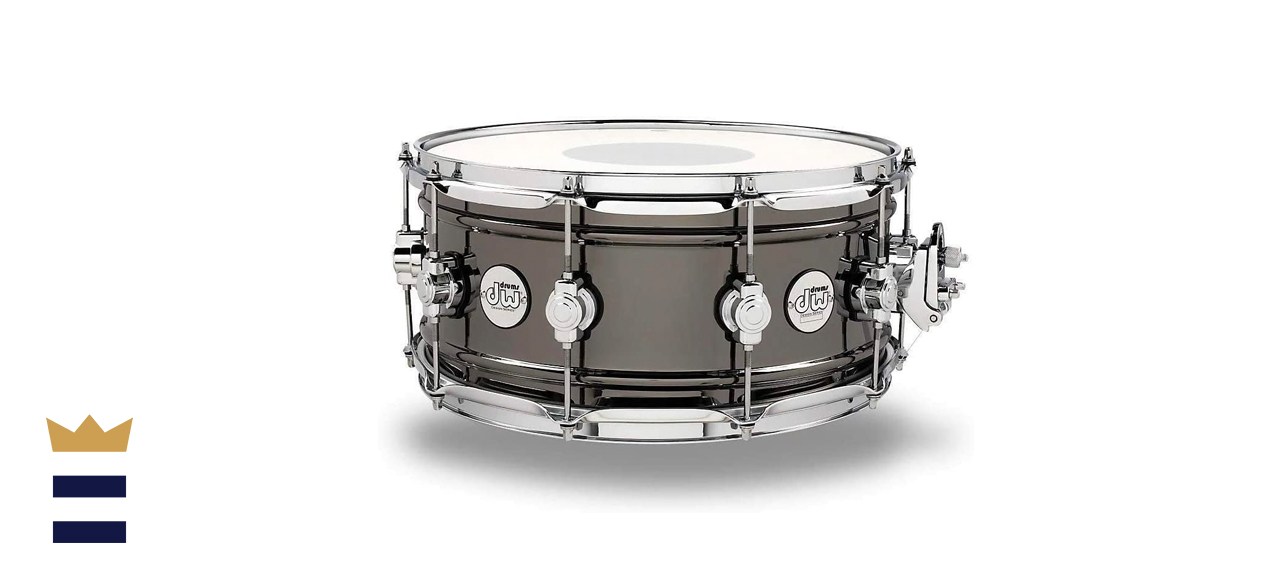Which snare drum is best?
The snare drum is often the centerpiece of a drummer’s kit. Even those who know little about music or who have never taken a seat behind a drum set know the importance of a great, expressive snare drum as it cuts through the mix and keeps the band and audience in sync.
The Yamaha Stage Custom Birch 14 x 5.5-Inch Snare Drum is the best snare drum available for both beginner and intermediate drummers. With its wood construction and quality hardware, this model provides great tone and feel at an affordable, entry-level price.
What to know before you buy a snare drum
Diameter and depth
While many factors go into producing a quality snare drum, ultimately your own personal style and preferences determine which instrument works best for your needs.
The size of your snare drum not only affects how you position and play it, but also the sound of the drum itself. Small snare drums have a higher-pitched, tighter sound, while larger, deeper drums produce a thicker tone with more low end.
Material
As with size, material is a factor in determining the sound of your snare drum. Snare drums are available with wood, metal, synthetic and hybrid shells. Each material has different tonal characteristics, with metal snares in particular delivering a crisp, loud crack. Also consider the issue of weight when it comes to transporting your gear. Metal snare drums weigh significantly more than those made of wood or fiberglass.
Appearance
Snare drums come in a wide range of finishes, coatings and appearances. Some musicians prefer their drums to match. Others are more than happy to sacrifice a unified look in favor of their preferred sound. You spend a lot of practice and performance time looking at your snare and drum kit, so select one that you feel complements your style and taste.
Sound and feel
Ultimately, the sound and feel of your snare drum determine how much you enjoy playing it and how versatile it is. While watching online videos can give you a general idea of an instrument’s sound, there’s no replacement for actually testing it out in person. The snappiness, bounce and tone of a snare drum are all up to your personal preferences.
Genre and use
While there are no hard and fast rules when it comes to what kinds of instruments are best for different genres, it’s worth considering what kinds of snare drums are typically used for the kind of music you like to play. A snare drum used for a marching band, for example, has very different characteristics compared to one designed specifically to play jazz or metal. Do some research into your favorite musicians and check out their recommendations. Keep in mind, however, that some of the most iconic musicians in history have ventured outside of genre norms to create their own unique sound.
What to look for in a quality snare drum
Stands and accessories
Some snare drums, especially those marketed to beginners, come in kits that include a storage bag, drum stand, cleaner, sticks and more. While accomplished drummers have much of this already at their disposal, anyone just starting out can find a lot of value in snare drums that come with useful accessories.
Reliable intonation
Snare drums are tuned by tightening the screws around the drumhead. A tighter snare produces a higher, crisper sound. Over time, however, these screws may loosen and your drumhead loses elasticity. Select a snare drum with a reputation for high-quality hardware that doesn’t loosen up between songs and require constant tuning and tightening.
High-quality hardware and materials
Many cheap instruments aren’t built to last. Low-quality metal can quickly rust and oxidize. Cheap, soft screws are easily stripped and poorly crafted wood can peel, chip and swell. If you’re looking for a snare drum that will stand the test of time, select one from a brand that has a reputation for quality materials and manufacturing.
Snare drum tips
Invest in a quality case for your drum
Hard-shell cases are best for extensive travel and gigging, but there are many padded soft cases available that also provide excellent protection.
Practice with a click track or metronome
While beginner drummers may find listening to a click while they play to be frustrating and limiting, doing so reinforces the understanding of proper time signatures. Being able to keep perfect time is a foundational skill for drummers in every genre.
Learn how to expertly tune your drums
Proper tuning can make the difference between a hollow, dull-sounding drum kit and a bright, lively performance.
How much you can expect to spend on a snare drum
Snare drums can cost as little as $50 for basic student models to thousands of dollars for vintage or premium-quality signature instruments. For most beginner and intermediate drummers, a snare drum that costs $100-$300 can provide years of growth and creativity.
Snare drum FAQ
I use the same snare drum as my favorite drummer. Why doesn’t it sound the same?
A. From playing style to the environment your drum set is kept in, there are a multitude of factors that come into play in determining the sound of a snare drum. Realistically, a professional snare drum recording will have been treated by an audio engineer in order to make it sound its best. EQ settings, compression and effects like reverb and delay can all greatly affect the sound of any recorded instrument. In some cases, a studio engineer may even completely replace a drummer’s actual audio with samples in order to simplify the mixing process and guarantee quality sound.
How do you store a snare drum?
A. Keep your drum in a cool, dry environment. Excess moisture can cause wood to deteriorate and metal hardware to rust or oxidize. Consider keeping your drum in a case or bag for long periods without use.
How do you clean a snare drum?
A. A buildup of sweat, grime and dust can all lead to a dirty instrument and rusted hardware. Clean your drum regularly with either a commercially available drum cleaner or a clean cloth and diluted window cleaner. Be sure to check with your drum’s manufacturer before cleaning to ensure that nothing you use in the process will damage your instrument.
What’s the best snare drum to buy?
Top snare drum
Yamaha Stage Custom Birch 14 x 5.5-Inch Snare Drum
What you need to know: This snare from Yamaha produces great sound at an unbeatable entry-level price.
What you’ll love: With different finishes and drums available, you can build an entire matching kit out of Yamaha’s offerings. Made from high-quality birch, this snare is an upgrade for users who have outgrown their beginner kit.
What you should consider: Some users report that this drum has an unsatisfying response to being hit, although most of these complaints vary depending on personal taste.
Where to buy: Sold by Amazon
Top snare drum for the money
EASTROCK 14 x 5.5-Inch Snare Drum
What you need to know: This snare drum bundle is an excellent value for student and beginner drummers.
What you’ll love: Available in many different colors and finishes, this snare drum bundle is ideal for budding rock stars of all ages. It includes a stand, sticks, a padded storage bag and even a shoulder strap for marching band use.
What you should consider: This drum’s small size and the stand’s height make it mostly appropriate for young or very small drummers.
Where to buy: Sold by Amazon
Worth checking out
What you need to know: This snare from DW is great for beginners and professionals alike.
What you’ll love: DW is a highly regarded manufacturer of premium drum equipment, and this snare lives up to their name with its clear, bright tone and high-quality construction.
What you should consider: For an entry-level drum, this snare is a bit on the expensive side.
Where to buy: Sold by Amazon
Sign up here to receive the BestReviews weekly newsletter for useful advice on new products and noteworthy deals.
Derek Walborn writes for BestReviews. BestReviews has helped millions of consumers simplify their purchasing decisions, saving them time and money.
Copyright 2021 BestReviews, a Nexstar company. All rights reserved.




